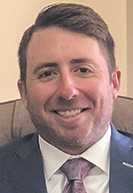Subscriber Benefit
As a subscriber you can listen to articles at work, in the car, or while you work out. Subscribe NowIn today’s legal world, it’s often not enough to just be a good lawyer — you also have to be good at selling your lawyering skills. Business development is a key function in today’s legal profession, with many larger firms staffing entire departments with employees trained to help their lawyers market themselves and bring in business.
Usually, new attorneys aren’t required to place significant emphasis on business development in their early days of practice, opting instead to focus on learning how to be a lawyer and developing their skills in a particular practice area. But after a few years, the focus shifts and young lawyers begin to look for work outside of what is assigned to them by their partners.
But with only a few years of legal experience, how can associates convince clients to entrust them with important legal matters? What steps can young attorneys take to make a name for themselves in an increasingly competitive market?

The answer, young lawyers say, will often vary depending on practice area, firm size and even individual personalities. In their limited years of experience, these lawyers say they’ve found the most success when they strike a balance between traditional networking and modern technology.
Early expectations
At many firms, new associates are given three to four years before they’re expected to begin bringing in business, associates say.
Stephanie McGowan, a senior associate at Frost Brown Todd, took advantage of those initial years by learning the skills of lawyering and honing her legal knowledge. Now, in her seventh year of practice, McGowan said she’s been shifting more of her focus to business development in a specific practice area over the last two years.
It was a slightly different situation for Brandon Tate, who, along with Kevin Bowen, formed Tate and Bowen immediately out of law school in 2013. For Tate, the pressure was two-fold — he had to learn how to be a lawyer and find his niche, and he had to build a successful and profitable business. To that end, Tate said he views marketing in two ways: from a business perspective he needs to network, and from a lawyering perspective, he needs to develop his skills.

And then there are attorneys like Beau Zoeller, a managing associate in FBT’s Louisville and Indianapolis offices, and Kent Winingham of Wilson Kehoe Winingham. Zoeller and Winingham come from different practice areas and firm sizes, but they both felt self-imposed pressure to drum up business for their firms very early in their careers.
“It’s not necessarily expected,” Winingham, who graduated law school in 2015, said. “But if you want to set yourself apart as a young attorney, that was the way to do it.”
Modern approach
In a 21st century law practice, Tate said attorneys who want to build up their business, regardless of age, need to have an online presence. Similarly, McGowan said it’s important to use modern technology, such as texting and emailing, to remain accessible to clients.
The key for young attorneys just starting their business development efforts, they say, is using technology effectively. For example, Tate said he and his partner want to ensure their website and logo make the young attorneys appear professional and competent.
Social media, particularly Twitter, is a big player in technological marketing. Zoeller, who’s been practicing for about seven years, uses Twitter to follow clients and potential clients and learn about their legal issues. McGowan uses the platform to get legal and other news, and she’ll often share the news she gets from Twitter with clients who might benefit from it.
More established technologies are also part of the mix. McGowan, for example, regularly gets online case updates from Justia, which she often compiles to send to clients for reference, or to use for her own reference in future court filings. And Zoeller uses a spreadsheet not only to track client and prospective client names, but also to track the last time he connected with them, how they connected and what they discussed.
“To maintain my network, it’s important to keep track of it — reaching out and keeping in touch with people,” Zoeller said. “It’s important — being organized and networking.”
Tried and true

Though technology can be a helpful tool, the young attorneys say they still find the old way of building business — namely, meeting new people — remains the most effective tool in their business development arsenal. Winingham, for example, doesn’t spend much time online; he prefers to meet with potential clients in-person, and he thinks that works to his benefit.
“It’s easier to set yourself apart if you do try to connect individually with people,” Winingham said. “You don’t see a lot of young attorneys doing that — they’re so used to connecting remotely or electronically.”
But like technology, networking is only effective if you do it intentionally, the young lawyers say. Winingham’s strategy has always been to join legal boards and organizations, and he also used to place a lot of emphasis on getting direct referrals. But it was when he stopped pressuring himself to find business opportunities and instead began enjoying the networking process that he began to see results from his efforts.
Zoeller stresses the importance of understanding the nuances of people’s personalities. One client may like to discuss their family, while another client may be all business. One client might want to talk on the phone, while another wants an email. Knowing such particulars about a person, Zoeller said, helps build the ever-important trust between a young lawyer and a potential client.
For McGowan, getting involved in organizations outside of the legal field also has been important to her business development efforts. She enjoys playing on a recreational soccer team, and she recently learned that one of her teammates attended a Frost Brown Todd conference for her own work.
“Will business come out of that? I don’t know,” McGowan said. “But she knows where I work and what I do.”Business investment
While there’s pressure on young lawyers to get out and make their names known, they say they also need the support of their firms to get access to the right business development tools.
“I think firms make a really big mistake when they don’t encourage associates to attend certain events and don’t help or try to compensate for those events and encourage that type of action,” said Winingham, who initially practiced in Chicago. “… I think that’s just part of running the business.”

As a two-person shop, Tate knows well the importance of committing firm resources to business development. Everything he and his partner do is a reflection on their business, he said, so the image they’re projecting is always top-of-mind.
“The branding is us,” he said.
As technology and the practice of law evolves, Tate said his firm makes it a point to annually review the latest updates. That kind of effort, the young attorneys say, is what’s required of new lawyers who want to be known as effective attorneys who benefit their clients and their firms.
“You need to keep an eye on the tools of business development,” McGowan said. “You don’t want it to be five years later and all you’ve done is come into work in the morning and leave in the evening.”•
Please enable JavaScript to view this content.

